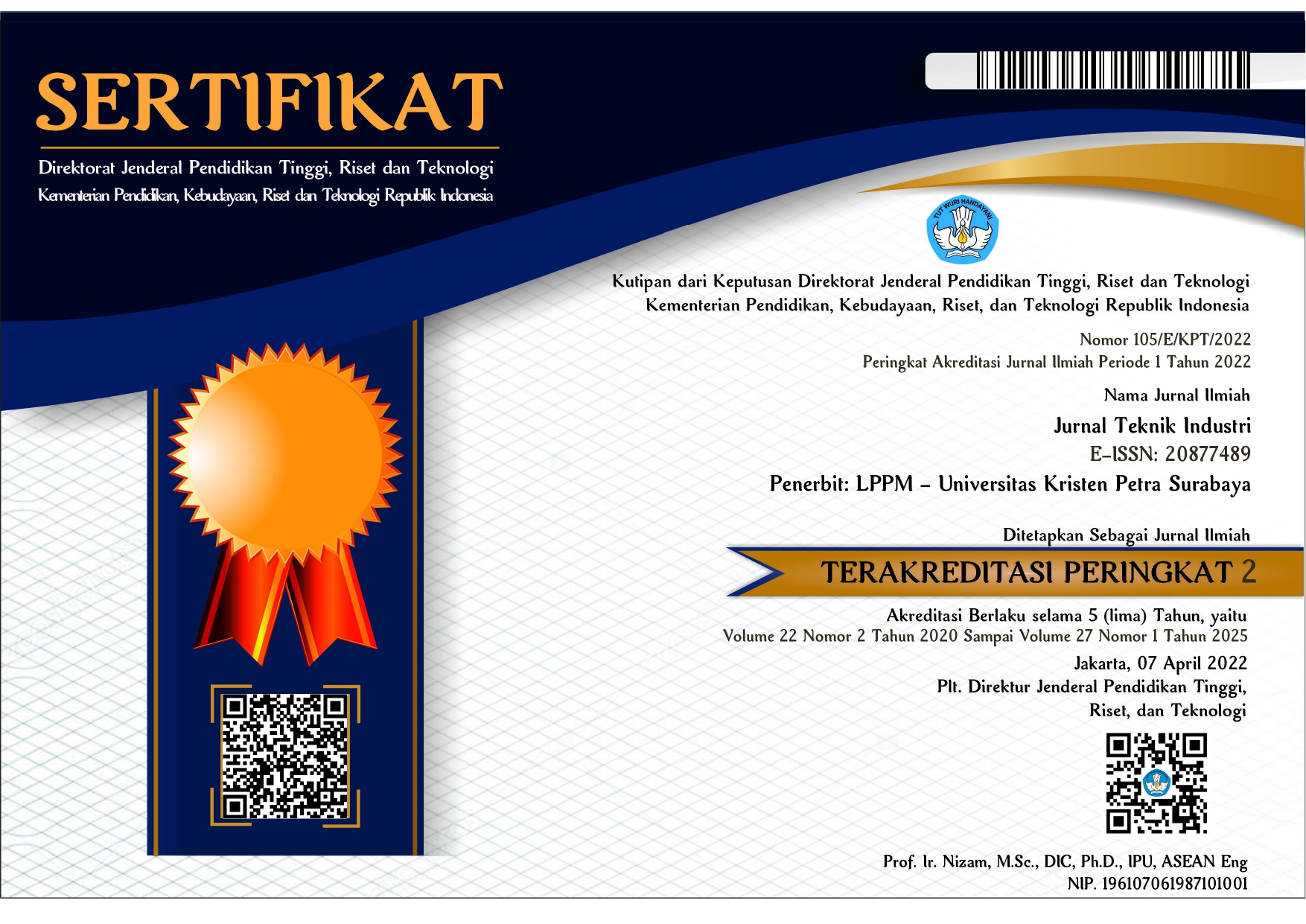Dampak Kompetensi Key user ERP terhadap Kinerja Inovasi dan Kinerja Kualitas Guna Meningkatkan Kinerja Organisasi
DOI:
https://doi.org/10.9744/jti.15.1.57-66Keywords:
Key user competence, innovation, quality and organization perfor¬man¬ceAbstract
Implementation EntERPrise Resource Planning (ERP) requires user key to have a reliable competency especially in personnel management. For this study, a survey was conducted using interviews technique and distributing questionnaires to 80 manufacturing industry practitioners, with response rate 88.75%. Additionally, the data analysis was done using PLS with Jawa Web Start program. The findings of the research are: There is no influence between knowledge and skill in quality performance and innovation performance in improving the performance of the company while implementing the technology of ERP. Personality Characteristics affect the increase of quality performance and innovation in the improvement of the company's performance while implementing ERP technology. Demonstrable Performance effect the increase in the quality of performance and innovation in improving the company's performance while implementing ERP technology. Innovation performance and Quality performance together have a direct impact on enhancing the performance of companies while implementing ERP technology.Downloads
References
Amoako, K., and Gyampah, ERP Implementation Factors A Comparison of Managerial and End User Persepectives, Business Process Management Journal, 10(2), 2004, pp. 171-183.
Bradford, M., and Florin, J., Examining the Role of Inovation Diffusion Factors on the Implementation Success of Enterprise Resources Planning Systems, International Journal of accounting Information System, 4, 2003, pp. 205–22.
Calisir, F., and Calisir, F., The Relation of Interface Usability Characteristics, Perceived Usefulness, and perceived Ease of Use to End-User Satisfaction with Enterprise Resources Planning (ERP) Systems, Computer in Human Behavior, 20, 2004, pp. 505-515
Chien, S. W., Hu, C., Reimers, K., and Lin, J.S., The Influence of Centrifugal and Centripetal Forces on ERP Project Success in Small and Medium-Sized Enterprises in China and Taiwan, International Journal Production Economic, 107, 2007, pp. 380-396.
Choi, D. H., Kim, J., and Kim, S. H., ERP Training with a Web-Based Electronic Learning System: The Flow Theory Perspective, International Journal of Human Computer Studies, 65, 2007, pp. 223-243.
Crawford, L., Senior Management Perceptions of Project Management Competence, International Journal of Project Management, 23, 2005, pp. 7-16.
Gupta, A., Enterprise Resources Planning: The Emerging Organizational Value System, Industrial Management and Data System Journal, 100(3), 2000, pp. 114-118.
Heywood L, Gonczi A, and Hager P., A Guide to Development of Competency Standards for Professions, Canberra: Australian Government Publishing Service, 1992.
Hong, K., and Kim, Y., The Critical Succsess Factor for ERP Implementation: An Organizational Fit Persepective, Information and Management, 40, 2002, pp. 25-40.
Leon, A., Enterprise Resources Planning, McGraw-Hill Publishing Company Limited, New Delhi, 2005.
Love P. E. D., Irani, Z., and Edwards D. J., Learning to Reduce Rework in Projects: Analysis of Firms Organizational Learning and Quality Practices, Project Manager Journal, 34(3), 2003, pp. 13–25.
Meredith, J. R., and Mantel, S. J., Project Management A Managerial Approach 4/e” Published by John Wiley & Sons, Inc, Presentation Prepared by RTBM WebGroup, 2004.
Olorunniwo, F., Hsu, M. K., and Udo, G. F., Service Quality, Customer Satisfaction, and Behaviour Intentions in the Service Factory, Journal of Service Marketing, 20(1), 2006, pp. 59-72.
Park, J. H., Suh, H. J., and Yang, H. D., Perceived Absorptive Capacity of Individual Users in Performance of Enterprise Resources Planning (ERP) Usage: The Case for Korean Firms, Information & Management, 44, 2007, pp. 300-312.
Prajogo, D. I., and Sohal, A. S., The Integration of TQM and Technology/R&D Management in Determining Quality and Innovation Performance, The International Journal of Management Science Omega, 34, 2006, pp. 296-312.
Rajagopal, P., An Innovation-Diffusion View of Implementation of Enterprise Resources Planning (ERP) Systems and Development of Research Model, Information & Management 40, 2002, pp. 87-114.
Razmi, J., Sangari, M.S., Ghodsi, R., Developing a Practical Framework for ERP Readiness Assessment Using Fuzzy Analytic Network Process, Advances in Engineering Software, 40, 2009, pp. 1168–1178.
Sarkis, J., and Gunasekaran, A., Enterprise Resources Planning Modeling and Analysis, European Journal of Operational Research, 146, 2003, pp. 229-232.
Soja, P., Succsess Factor in ERP Implementation: Lesson from Practice, Journal of Enterprise Information Management, 19(6), 2006, pp. 646-661.
Solimun, Bahan Ajar Metode Kuantitatif, Universitas Brawijaya Malang, 2007.
Somech, A. and Anat D. Z., Exploring Organizational Citizenship Behaviour from an Organizational Perspective: The Relationship Between Organizational Learning and Organizationa Citizenship Behavior, Journal of Occupational and Organizational Psychology, 77, 2004, pp. 281-298.
Spathis, C., and Constantinides, S., The Usefulness of ERP System for Effective Management, Industrial Management and Data System Journal, 103(9), 2003, pp. 677-685.
Spencer, L. M. J., and Spencer, S. M., Competence at Work: Models For Superior Performance, 1st ed., New York: Wiley, 1993.
Sun, A. Y. T., Yazdani, A., and Overend, J. D., Achievement Assessment for Enterprise Resources Planning (ERP) System Implementation Based on Critical Success Factors (CFS), International Journal Production Economics, 98, 2005, pp. 189-203.
Warta Ekonomi, Warta Ekonomi 6 Juni 2002, wartaekonomi.com.
Wang, E., Ying, T.C., Jiang, J., and Klein, G., Group Cohesion in Organizational Innovation: an Empirical Examination of ERP Implementation, Information and Software Technology, 48, 2006, pp. 235-244.
Wu, J. H., and Wang, Y. M., Measuring ERP success: The key-users Viewpoint of the ERP to Produce a Viable IS in the Organization, Computer in Human Behavior, 23, 2007, pp. 1582– 1596.
Zang, Z., Lee, M. K. O., Huang, P., Zhang, L., and Huang, X., A Framework of ERP Systems Implementation Success in China: An Empirical Study, International Journal Production Economics, 98, 2005, pp. 56-80.
Downloads
Published
How to Cite
Issue
Section
License
Articles published in the Jurnal Teknik Industri: Jurnal Keilmuan dan Aplikasi Teknik Industri will be Open-Access articles distributed under the terms and conditions of the Creative Commons Attribution License (CC BY).
![]()
This work is licensed under a Creative Commons Attribution License (CC BY).


















